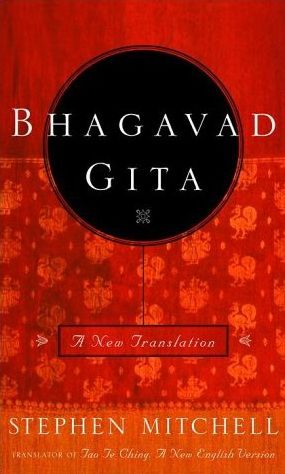(Complete contents at
Gita in a Nutshell: Big Ideas and Best Quotations.
For notice of each weekly blog,
please join our Facebook group.)
Another major difficulty many readers have with the Gita is that at first it seems to be telling us to repress all our ordinary human emotions. Here is a wonderful conversation from Gita Talk #4 that deals directly with this question:
freesoul:
I so can relate w/Michele, when you say “you have no cause to grieve for any being…” that just got to me, I had to read chapter two a few times and then I was ready to bag the whole book. I kept thinking how can I turn off my emotions so easily.
Bob:
Dear freesoul. I’m so glad you hit us squarely with this issue: “Is the Gita telling us to turn off all our emotions, to live without passion?”, because I’m sure this is on the minds of many readers. It certainly was on mine the first time I read it.
I believe I can give you an answer that is crystal clear, profound, and readily usable in everyday life. But you be the judge.
The Gita does not, as whole, endorse emotional repression, even though it seems to be doing exactly that here. What the Gita asks us to do is be our human selves completely, feel deeply all our human emotions, but develop the ability to step outside ourselves and calmly witness those emotions in a completely non-judgmental way.
Even though the text right here seems to say otherwise, the situation itself supports this idea. Think about it. Krishna is urging Arjuna to fight a battle to the best of his abilities. Does Krishna think Arjuna can can fight his battle (just make that a metaphor for whatever challenges we face in life) without emotion and passion?
No, of course not. Even though the text isn’t clear on this, the situation is. Krishna is telling Arjuna to fight his battle with all this usual passion, but to be able, at the same time, to rise above it and objectively see that he is also a part of the infinite, unfathomable, wondrous universe, where these emotions hold no sway.
Tell me if this makes sense. And I hope other people will jump into this vital discussion as well. Your question really does go to the heart of the Gita.
Vanita:
Thanks for the great discussion, everyone. I always reject 2.57 and sentiments like it. “who neither grieves or rejoices if good or bad things happen’. It conjures up images of Stepford wives, mothers, friends….. fill in the blank. For me, I prefer – grieve for a moment, rejoice for a moment, then accept it and move on.
Lucky for me “on this path no effort is wasted.. ” (2.40). There is hope, yet.
Bob:
Agree, Vanita. In the next chapter you’ll read the seemingly contradictory line:
All beings follow their nature.
What good can repression do? (3.33)
2.57 is actually part of a larger idea in Yoga philosophy called “Witness” Consciousness (what I describe above), which means simply the ability to step outside ourselves and watch our emotions non-judgmentally.
But that’s not described fully in 2.57. Obviously the whole idea of being a witness assumes there is something to witness, i.e. that we are still feeling all our human emotions. In 2.57 we have only the witness with no mention of the witnessed! That’s why I put an “E” for “Explain” next to this item in my list.
Does this make sense? Please ask follow-up questions.
Sevapuri:
i understand your feelings that this can be read as “just feel nothing” but i think Krishna is telling us to not let grief or joy overwhelm us to the point where we forget who we really are. Krishna’s dialogue is continually reminding Arjuna who he is, that he is not only Arjuna but part of the whole universe, this it what i think we can forget so easily when we get caught up in joy grief, pain pleasure etc.
John Morrison:
Yes, when one watches their emotions without judging – this is freedom. We can have emotions but engage them with equanimity. We are no longer swept along like a stick in a raging torrent, completely at the mercy of our own discursive thoughts and emotions. Instead we are a boulder within the river, watching the emotions pass around us. The boulder is not emotionless – it is effected by emotions – but it is not at their mercy….
This pivotal Yoga idea of “Witness Consciousness” is fully developed in Chapter 13 of the Gita. Here are the highlights:
What are Nature and Self?
What are the field and its Knower,
knowledge and the object of knowledge?
Teach me about them, Krishna.
This Body is called the field,
Arjuna; the one who watches
whatever happens within it—
wise men call him the Knower.
I am the Knower of the field
in every body, Arjuna;
genuine knowledge means knowing
both the field and its Knower. (BG 13.0-2)
~
It is called the witness, the consenter,
the sustainer, the enjoyer, the great Lord,
and also the highest Self,
the supreme Person in this body. (BG 13.22)
~
By meditation, some men
can see the Self in the self;
others, by the yoga of knowledge;
others, by selfless action.
Still others, not seeing, only
hear about it and worship;
they too cross beyond death,
trusting in what they have heard.
Whatever exists, Arjuna,
animate or inanimate,
has come into existence
from the union of field and Knower.
He who sees that the great Lord
is equally in all beings,
deathless when every being
dies—that man sees truly.
Seeing the great Lord everywhere,
he knows beyond doubt that he cannot
harm the Self by the self,
and reaches the highest goal.
He who sees that all actions
are performed by Nature alone
and thus that the self is not
the doer—that man see truly.
When he sees that the myriad beings
emanate from the One
and have their source in the One,
that man gains absolute freedom. (BG 13.24-30)
~
Just as the sun by itself
illumines the entire world,
so the field owner illumines
everything in the field.
He whose inner eye sees
how the Knower is distinct from the field,
and how men are set free from Nature,
arrives at the highest state. (BG 13.33-34)
Previous:
#6: Gandhi’s Bible or a Call to War?(Complete contents at
Gita in a Nutshell: Big Ideas and Best Quotations
To receive notice of each weekly blog,
please join our Facebook group.)












Read 17 comments and reply